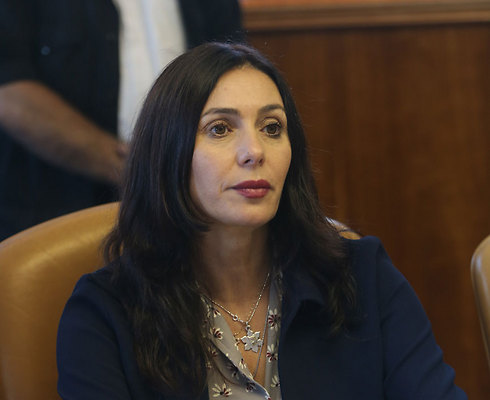

Regev to submit culture bill- no loyalty, no funding
The bill entitled 'loyalty in culture', to be submitted on Wedensday, ensures that state funding is denied to state cultural institutions that, among others, attack or disgrace state symbols, incite to terrorism or deny Israel's existence as a Jewish and democratic state.
Culture Minister Miri Regev will submit a bill Wednesday to the Knesset's Education Committee entitled "loyalty in culture", Ynet learned Tuesday.
This amendment seeks to change the way her office supports cultural institutions, and to deny state funding to those who attack or disgrace the state flag or state symbols, incite to racism, violence or terrorism, mark Independence Day as a day of mourning or deny Israel's existence as a Jewish and democratic state.
Regev's relations with Israeli artists were sensitive from the start of her appointment. Harsh personal criticism was leveled at her, and later the storms surrounding her turned into a political affair in the controversy regarding the play "A Parallel Time", about Walid Daka, convicted of planning the murder of IDF soldier Moshe Tamam in 1984. At that time, Regev froze state funding for the al-Midan theater where the play was being performed.
This is the first time that a bill closely ties artistic content to the receipt of funding and support of artists from state cultural institutions. As part of what she calls "cultural justice", she will make changes to the criteria of the Support Committee at the Ministry of Culture and Sports.
"I will not be an ATM"
Article 3a of the budget law currently states that a cultural institution can be fined retroactively if it infringed on the laws of the State of Israel, but this is a long process at the discretion of the Finance Minister, so that in practice the Ministry of Culture is obliged to continue funding institutions in any event and does not set policy.
Beyond that, says Regev, it is necessary to transfer these powers to the Ministry of Culture due to the fact that the Finance Ministry does not interface with cultural institutions, and the same goes for the mechanism for supervising them. According to her, the mechanism currently is inadequate and the state is funding institutions without any supervision.
"It is the Ministry of Culture's responsibility to supervise cultural institutions, including what they offer, and make sure they are not breaking the country's laws," said Regev. "Cultural institutions are not above the law. They must work according to the laws of the State of Israel and we must make sure of this – and not keep our eyes closed. I will not be an ATM. I have a responsibility for public monies and this law would grant me the authority to exercise my responsibilities and to deny support for institutionalized violations of the law".
















